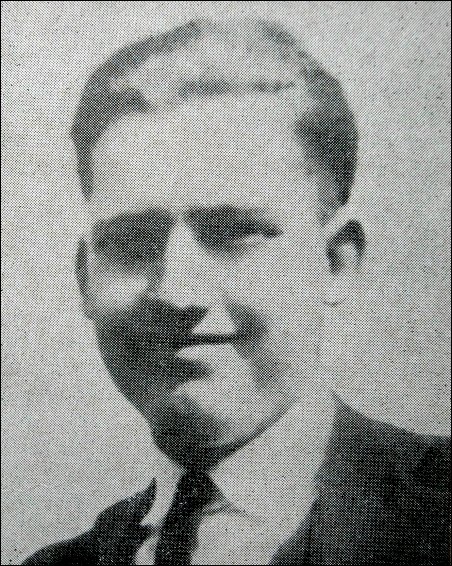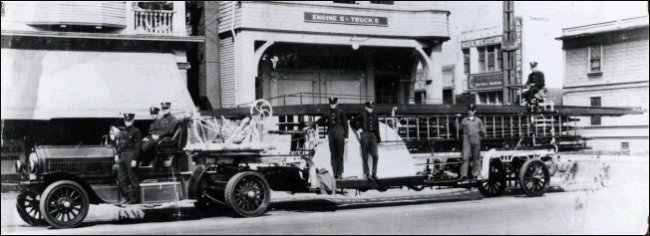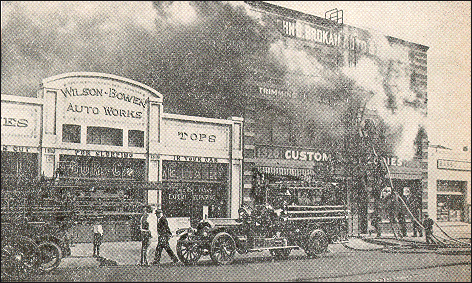|

Ercil Morse
By Bob Patterson
F or the
second time within the short period of two years, death roared out of the big doors of
Engine 5s with his cold hand on a tillerman's shoulder. This time he had picked a real
specimen of fire department personnel, six-foot-four Ercil Morse, a man known
affectionately as "The Giant" by his many brother fire fighters.
Morse, the brother of present appointed Chief "Tiny" Morse, was assigned to
Truck 5 from the first day he entered the job. From then on he managed to occupy a
reserved spot in the hearts of his companions due to the eternal boyish grin that topped
his towering frame. The enjoyment he experienced in his association with fellow firemen
was exceeded only by his love of a rough and friendly scuffle. His size made him hard to
get hold of but easy to upset, thus putting him in the constant role of challenger and
loser to the point of causing a continual uproar at the daily wrestling program he would
laughingly provide. He had so welded his personality to the activities of the men and
officer that he soon became a "character" within the battalion, a man any
commanding officer would hate to transfer or otherwise lose. Morse's work was close in
comparison to that of some of the older, more experienced men, both because of the
apparent ease with which his bulk enabled him to handle equipment and the fact that he had
applied himself to the study of fire fighting methods with commendable faithfulness. He
had the distinction of being the youngest and biggest man on the force. What final goal
these characteristics might have allowed him to achieve if he had been allowed the full
quota of opportunity can only be surmised.
|
For some time previous to his last run, Morse had been practicing the
duties of tillerman by piloting the ladder-hung
trailer back from the scene of alarms. The exacting demands of the wheel's operation had
been mastered by the young fireman to such a point that it was now being considered a
position of his own. Thus it became his privilege to occupy the conspicuous post of
tillerman when the time came for department photographs to be taken of Engine and Truck 5.
The time was duly set, and upon its arrival the crew turned out in their afternoon blues,
shoes and badges polished to high lustre, and stepped into position for their picture. The
engine company had just completed their take and Morse was climbing into the tiller seat
in preparation to maneuver the truck into an outside position when the high pitched
resonance of fire gongs sounded throughout quarters. Morse heard the two leading clangs of
a second alarm and tensed in his seat. This was an initiation he didn't particularly go
for. It was bad enough to undergo the tension of answering your first alarm as tillerman
without making it a "second." He watched the anxious crew around the printer
case as the little perforated tape jerked out its message, his heart pacing the rhythmic
clangs of the alarm. Suddenly the captain held up a restraining hand and Ercil saw his
lips purse the word "Thirty's." The heave of relief left his lungs in a rush,
and just as quick he was sorry. That initial responsibility had to be met some time, and
why not to the tune of a blazing two-bagger as to that of any other? Oh well, next time.
He twisted the wheels until the ladder-beams paralleled the side of the station and the
auto fireman cut the motor. Lieutenant Rainey lined up his camera, looked up and down the
attentive line, and shot the last picture Morse was destined to have taken. As if touched
off by the click of the camera's shutter, a long tremulous ring suddenly sounded out from
the alarm panel. The crew turned as a unit to grab up their turnout coats and axes as the
captain ran for the fire-phone. Morse didn't
move from his seat for he knew this was to be another chance at an opportunity he'd just
missed.

Only a few minutes after this picture was taken death had
beckoned to the young man shown in the tillerseat. (Truck 5).
"We're going in, men." Cap Carpenter headed for his place on the rig as he gave
the location, "1320 South Main. We're coverin' for 30s--they've
broken a Bendix."
Auto-fireman Bulkley had a straight shot from the outside position
in which the apparatus stood, and lost no time in getting under way. Morse tracked neatly
behind on the turn into Fourth and his pal, Burk, grinned an approval as he buckled on an
axe. It was an exceptionally long run and the big youngster hunched over the wheel in a
determined attempt to give all his attention to the responsible job he was undertaking.
The tiller wheel appeared a toy in the capableness of his huge hands even though they
showed a little whiteness at the knuckles.
From Fourth and Los Angeles, the crew could see the red sheets of
flame flashing against the underside of wildly gyrating smoke masses and knew that they'd
hit a good one. It had started in quiet concealment, swelled within the closed building,
and burst forth in full fury at their point of arrival. Morse ducked his head against a
swirl of hot cinders as the myriad of scorched odors suddenly swept over his exposed
position. The street was wet and hot, with hundreds of white pyres where embers were
hitting the water. Firemen were leaping the interlocking hose-lines with ladders, lines,
and axes carried high as they disappeared through the smoke-draped doorways and up fire
escapes. One group, backed by a loaded line, was attempting entrance at the second floor
fire escape entrance but were almost entirely cut from view due to the smoke. Suddenly,
vivid flame engulfed the escape from the treacherous belly of a back-flash, blasted every
window in the structure and hurled the firemen to the pavement below. Ambulances were
summoned and had begun their screaming journey when Truck 5 found its position at the rear
of the burning structure and Morse leaped from his seat to duty. Hard on the heels of
Captain Carpenter, he swung his long body up the ladder rungs to the roof of the adjoining
building. Auto-fireman Bulkley vaulted the firewall to follow Morse to the forward part of
the building and witnessed him cut a right angle course to avoid the hardly
distinguishable roof-level skylights. Following at a distance of approximately fifteen
feet, Bulkley had gained a position opposite a ladder set against the burning structure
when he heard an order from his captain.
|
|
"Remove the ladder and bring it to the other window, boys." Cap's voice
was partly overlapped by the roar of fire and Bulkley glanced up
to see if Morse had heard it. Outlined against the smoke, the lad was seen to turn in
response. Satisfied, the auto-fireman reached for the ladder. Above the howling sweep of
flames he heard a nearby crunch of collapsing glass, followed by a muffled thud of impact.
He snapped his head around toward Morse. The roof was bare.
The firemen dropped their equipment and ran to the spot. A thin
veil of black smoke drifted over a gaping hole in the skylight. Far below lay the body of
young Morse, his big frame crumpled on the concrete floor.
The men raced down the ladders to the aid of their injured
companion and directed the already present ambulance attendants to the spot. The youth was
carefully placed on a stretcher and rushed to the receiving hospital. There he died at
5:25 a.m., April 7, fourteen hours after the fatal plunge, mercifully escaping the
undeniable agony of consciousness.
The cause of death was pronounced a basal skull fracture. Whether
Morse had struck the back of his head on a girder while falling, or when he contacted the
concrete below, is a question raised by his injury. He is said to have controlled his body
and lit finally on his feet, for the handle of the axe struck the floor and drove his head
into the left side of the abdomen, an occurrence that might have killed him instantly had
he been a man of average height.
The genuine loss to the department and personnel of one yet so
young, strong, and full of life can be instantly realized by any person appreciating the
atmosphere of excellent morale about such a man. The sorrow of the Los Angeles Fire
Department is effectively expressed by a letter from Chief Engineer Scott to Mrs. Morse,
the youth's mother, which we have copied below:
|
Mrs. M. E. Morse,
541 Fairmont Avenue,
Glendale, Calif.
Dear Madam:
Personally and on behalf of the members of the Los Angeles Fire
Department, for whom I have the honor to be spokesman, permit me to express to you and
members of your family at this time, our deep concern and heartfelt sympathy in your
recent bereavement.
There are times when words fail to convey the depths of brotherly
feeling, when in this dangerous service of ours some man is called upon to pay the extreme
penalty which the work exacts. There is not a man in the department whose heart does not
go out in sympathy to those who are left behind, for no one of us knows that the next
alarm of fire may not be the last call for him.
The departed boy was giving splendid service and was well loved by
all his associates. Not a blot appears upon his record in this trying service. Many men
have boasted of less than this.
Respectfully,
R.J. Scott,
Chief Engineer.
|
|
|
On their way from Court and Olive streets, where the services for the
young fireman were held, the impressive procession of grief-stricken relatives,
friends and brother fire-fighters were destined to pass the open doors of Engine
16, in front of which the entire personnel of that company stood in reverent
attention. As the car bearing the body of the youth came to a position opposite
the station, a long ring burst forth from the alarm panel. It supplied a fitting
salute from the hand of God himself, it would seem, to the vivid and eternal
memory of Ercil Morse.

Through a skylight on this building (at 1320 S. Main St.) Ercil Morse plunged to his death.
|